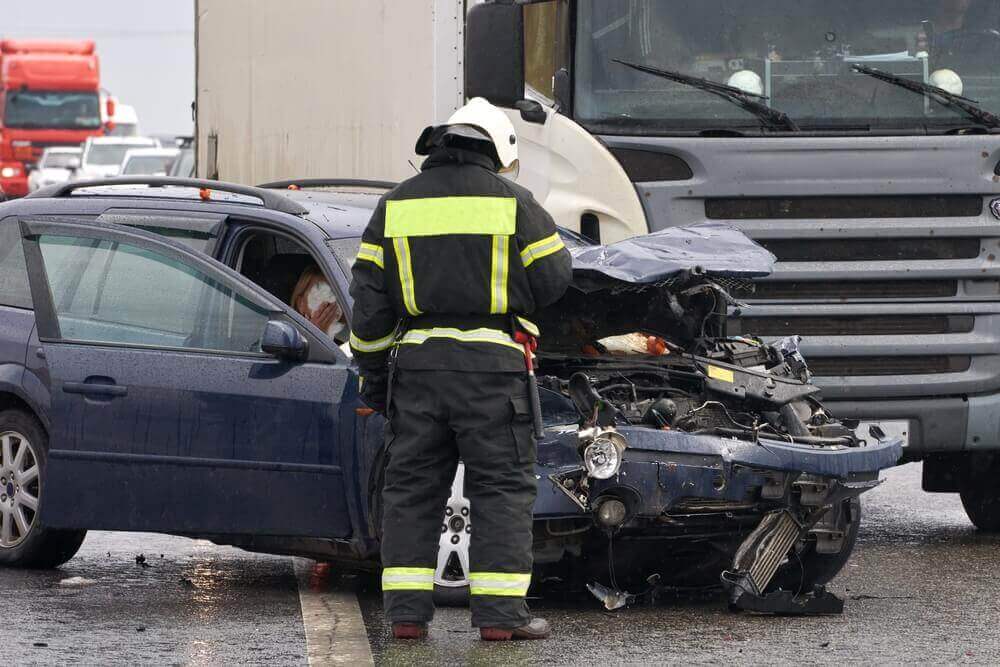
Some of the worst traffic accidents in Georgia happen on highways. Far too many of these crashes occur on urban Atlanta interstates, where negligent speeding, distracted driving, and road rage are common. Any high-speed collision can leave victims with severe injuries and overwhelming medical costs. If someone else is responsible for those injuries, Georgia law allows injured people to seek financial compensation for their losses.
Not sure what to do after a crash? A hard-hitting Atlanta highway accident lawyer can guide you through your legal options, determine fault for the collision, and pursue maximum compensation for you. At Bayuk Pratt, our experienced highway accident attorneys know Atlanta roads, understand the hazards and can advocate for your best interests during settlement talks with the insurance company or at trial.
Our law firm has recovered more than $300 million for personal injury clients to date. Put us to work for you. Call or contact us today to discuss your case in a free consultation.
Where Are the Most Dangerous Highways in Atlanta?
Atlanta’s highways are notorious for heavy congestion and high accident rates, especially along heavily trafficked Atlanta throughways like I-285, I-75, I-85, and I-20. Speed, alcohol, frequent lane changes, and a high prevalence of commercial motor vehicles are all cited as hazards that contribute to local highway accidents.
Sometimes, highways require repair and maintenance due to heavy traffic. Unexpected construction equipment, like barriers or heavy vehicles, can block or narrow lanes, causing drivers to swerve to avoid these obstacles and potentially careen into neighboring vehicles. Contact our Atlanta highway accident lawyers today.
What Are the Common Types of Accidents on Georgia Highways?
Atlanta’s highways see a wide variety of auto accidents with an equally varied range of causes. Examples include:
- Rear-end collisions – Stop-and-go traffic can create an environment conducive to rear-end accidents. Some of these collisions and the resulting back-and-forth motion can cause painful injuries for drivers and passengers alike, such as whiplash and concussions.
- Multi-vehicle crashes – High speeds, low visibility, tailgating, and failure to check blind spots can create dangerous traffic conditions and lead to chain-reaction crashes in Atlanta.
- Head-on collisions – These front-end crashes happen when two vehicles heading in opposite directions collide. Distracted driving or fatigue can contribute to frontal crashes on Georgia highways.
- Sideswipes – A sideswipe accident happens when two vehicles collide side-to-side. Reckless driving, inattention, drunk driving, unsafe lane changes, and other factors can lead to sideswipe accidents.
What Causes Most Highway Accidents in Atlanta?
Distracted driving is a top cause of car accidents nationwide, and the Georgia Governor’s Office of Highway Safety notes that cell phone use is responsible for the majority of crashes in the Peach State. Whether by texting, eating, talking to passengers, or adjusting a GPS, anything that takes the driver’s attention off the road presents a risk, especially on a metro Atlanta highway.
Speeding is another serious problem in the state, with speed-related fatalities up 11 percent in a single recent year. Driving under the influence of alcohol or drugs is also prevalent. In one recent year, Georgia saw over 500 car crash fatalities due to impaired driving. Contact our Atlanta car accident attorney today.
What Are the Most Frequent Injuries in Georgia Highway Collisions?
The speed limit on most Georgia highways is between 65 and 70 miles per hour, but countless drivers exceed those limits every day. Highway accidents that occur at high speeds can cause severe injuries with lifelong consequences.
The most common types of injuries on Georgia freeways include:
- Broken bones
- Traumatic brain injury (TBI)
- Spinal cord injury
- Deep cuts and lacerations
- Facial and dental injuries
- Neck injuries
- Back injuries
- Internal bleeding
- Vital organ trauma
- Traumatic amputation
- Burns
Always contact 911 as soon as possible after a car accident in Atlanta. Not only will your medical records assist with your insurance claim later, but you can also get help with serious injuries that may not be immediately apparent. Our Atlanta highway accident lawyer can help.
Can I Be Compensated for My Injuries?
When another driver’s negligent actions cause a car accident in Georgia, you could have the legal right to pursue compensation for your injuries.
Generally, you can seek compensation (called “damages”) for two types of losses:
- Economic damages – Pays for losses that are easily calculated, such as medical bills, lost wages, rehabilitation costs, and ongoing financial expenses
- Non-economic damages – Money for intangible losses without a set dollar amount, such as pain and suffering, lost quality of life, loss of companionship, disfigurement, and mental anguish
Sometimes, Georgia juries award punitive damages in car crash cases. If there is clear and convincing evidence that an at-fault driver acted intentionally, maliciously, or with a disregard for safety that extends beyond negligence, there may be more fines and greater compensation to punish that driver and deter similar future behavior.
What Is the Statute of Limitations for a Highway Car Accident Lawsuit in Georgia?
In Georgia, you have two years from the date of a car accident to file a personal injury lawsuit. This deadline imposed by the statute of limitations ensures that the memories of those involved in the crash, the accounts of eyewitnesses, and any relevant evidence remain fresh and relevant. If you wait until the limitations period expires to file your lawsuit, you may lose your right to seek compensation.
Contact an Atlanta Highway Accident Lawyer
When you need a team of dedicated attorneys to help you pursue compensation after a collision, get in touch with the Atlanta highway accident lawyers at Bayuk Pratt. With more than 50 years of combined legal experience, our battle-tested attorneys don’t bow to lowball settlement offers from the insurance company. We fight back and get results that count.
Call or fill out our online form today for a free consultation.